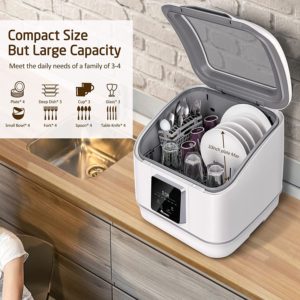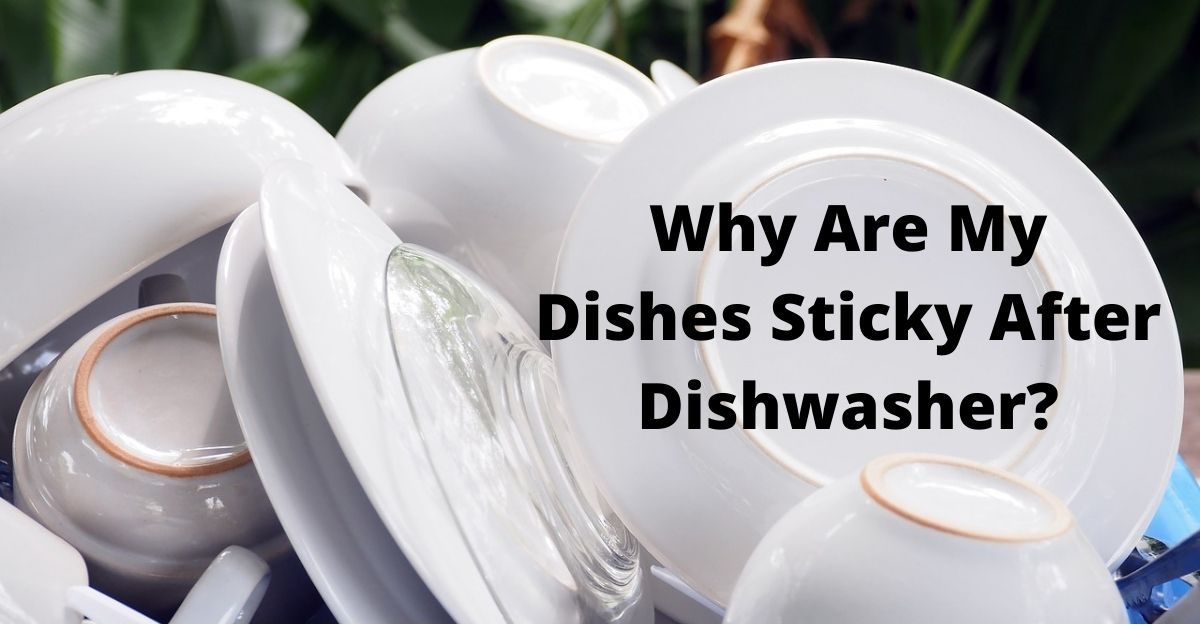Originally Created on: April 21, 2022 @ 9:42 am
Your dishwasher just completed it’s wash cycle, but you are not happy with the work it’s done. You end up pondering, why are my dishes sticky after dishwasher?
A common problem with dishes, particularly glasses and mugs, after they have been washed in the dishwasher is that they have an odd sticky film on them that won’t come off easily no matter how much you wash them by hand.
Unfortunately, this sticky film can also appear on other dishes and cookware. In this article, we will be looking at some of the key reasons why your dishes may be sticky after washing them in the dishwasher and ways to help you get rid of the stickiness.
Let’s get started.
Table of Content
Why are my Dishes Sticky After Dishwasher?
Your dishes are sticky after the dishwasher due to a number of reasons such as using the wrong dish-washer detergent, inadequate rinse aid and use of wrong dishwasher temperature settings during the wash cycle.
Other reasons why your dishes are sticky after a dish-washing cycle are the size of your dirty dishes and the time between washes, especially if you are not running your dish-washer that often.
Let’s now dive deeper into each of the reasons below and how exactly they contribute to your dishes being sticky after using your dishwasher.

Portable Countertop Dishwasher
Get value for your money!
- Large Capacity
- 7 Wash Cycle Options
- Anti-Leakage
- Practical Design
Reasons for Sticky Dishes After Dish-washing
a) Water Hardness
Hard water is often to blame for dishes that are still sticky after going through a cycle in your dishwasher. To avoid hard water deposits, make sure you’re using plenty of soap and running your machine on a normal cycle with no extra rinse or heat dry.
If you continue to run into trouble, consider installing a reverse osmosis filter system to soften your water and avoid problems with excess minerals in your dish-washing routine.
b) Detergent Residue, Inadequate Rinse Aid
Another common reason is that you are using a detergent with too much soap or not enough rinse agents. A good rule of thumb is to use about 1/4 cup of detergent for each load of dishes and to make sure that there’s always some rinse agent in your dispenser.
Using a detergent with too much soap in your wash cycle will lead to your dishes coming out sticky with detergent residue. When you notice this, you may want to reconsider your detergent option.
c) Cookware Material
The type of dishes can also make a difference. If you have very fine china or glassware, for example, it might be more prone to stickiness than other materials.
If you’re using a stone material like granite or marble, check to see if it’s labeled as safe for use in dishwashers. Most countertops aren’t safe for dishwashers because they have coatings that can deteriorate when wet and hot.
d) Load Size / Dirty Dishes Amount
Your dishwasher is a high-powered machine, and you can’t just throw in every single item you own. If your load is too large, it can compromise water pressure, and if there’s a lot of dirt on your dishes, they may not get cleaned properly. Make sure to distribute dishes throughout your wash basket so that no one area is overloaded.
e) Time Between Washes
If you don’t run your dishwasher often enough, grime and dirt can build up inside, which will lead to a sticky residue on your dishes. Aim for running it at least once a day if possible.
f) Dishwasher Temperature Settings
If you’ve changed your water heater setting from hot to warm or cold, then your dishes may not be getting as hot as they need to dry properly.
This is especially true if you have hard water and are using a lot of detergents. You can also try running your machine on a normal cycle with no extra rinse or heat dry for an extra-hot wash that will help get rid of any leftover residue.
g) Wrong Dishwasher Detergent Type/Brand
Using a dish-washing detergent that doesn’t match up with your machine’s specifications can cause all sorts of problems, including stickiness and spotting on dishes. If this is the main cause for your dishes to be sticky then you’ll want to try out a different brand or type of your dishwasher detergent.
You May Also Like: Why is my dishwasher making a clunking noise? (3 Key Reasons Why)
How Do you Get Rid of Dishwasher Residue on Dishes?
Dishwashers have been an appliance we can’t live without for a long time. If you notice your dishes are always coming out of your dishwasher stuck to each other or with a white film that makes it hard to see if they’re clean, then here are some things you should try to help you get rid of the residue.
1. Use White Vinegar
White vinegar is often the first thing we turn to when we notice our dishes aren’t coming out clean. It’s a natural de-greaser and will help remove that residue on your dishes. Simply fill your dishwasher with white vinegar and run it as you normally would, without any soap or detergent. Let it sit for an hour or so, then run another cycle with just water. The residue should be gone!
2. Try a New Detergent
If you’ve tried white vinegar and your dishes are still coming out sticky, it might be time to try a different dish-washing cleanser.
Try running an empty cycle with just water and one of your favorite brands of dish-washing liquid or powder. If that doesn’t work, try a different brand altogether! It might be time to switch things up if your dishes are still coming out sticky after trying vinegar and a new detergent.
3. Add a Rinse Aid
If you’ve tried everything and your dishes are still coming out sticky, it might be time to call a professional. Call your local appliance store and ask if they can take a look at your dishwasher to see what might be causing those dishes to come out sticky.
They should be able to give you some tips that you can try before they come and make house calls. You may just need a rinse aid! If all else fails, just pick up some Jet-Dry at any grocery store or home improvement store.
Do Dishwashers Leave Soap Residue?
Yes, some dishwashers leave soap residue after a wash cycle. The residue could be a result of using the wrong detergent, water hardness, using the wrong temperature settings or the amount of dirty dishes in a specific wash cycle.
Some dishwashers have an automatic dispenser that squirts out soap and water to help you clean your dishes more efficiently. If your dishes end up sticky, it’s likely due to residue from these machines, which may contain chemicals that cause dishes to leave behind a sticky film.
Consider purchasing a simple, low-tech dish scrubber and carefully rinsing each plate before putting it in the dishwasher; some people also find good results by using vinegar during their rinse cycle instead of soap or detergent.
Editor’s Pick: Can Melamine Go in the Dishwasher?
Conclusion
There are so many reasons why dishes might come out of your dishwasher sticky. It could be that you’re using too much detergent, or it could be that you have hard water and your soap is reacting with minerals in your water to form a film on your dishes.
If you’re noticing a lot of residue on glassware, especially, then it’s probably time to try something new—try switching brands or adding vinegar to your rinse cycle. It may take some trial and error, but eventually, you should find a solution that works for you!

